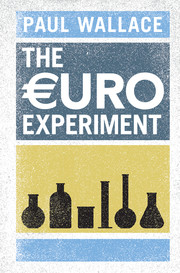6 - The existential crisis
Published online by Cambridge University Press: 05 December 2015
Summary
The idea of European monetary union was a distant dream when the Eagles released their album, ‘Hotel California’, in 1976. But the west-coast band's spaced-out lyrics turned out to be prescient for the euro thirty-five years later as the currency union stumbled into a crisis that threatened to tear it apart. Was the euro area, like the hotel, a place where you could check in but never leave? If that was the nightmare for a country like Greece as its citizens weighed the immediate pain of a ‘Grexit’ against an uncertain future gain as an economy unshackled from the euro, the existential nightmare for the euro area was that a country might indeed leave, and in the process destroy the single currency itself.
That prospect looked most threatening in 2012. Yet three years later, Greece went even further to the edge. The potential economic harm to the rest of the euro area in 2015 appeared to be much more contained than in 2012, although no one could be entirely sure about this in practice. By contrast, the political damage of the clash among euro-zone leaders at their weekend summit in July as Greece desperately sought to remain a member while Germany openly pressed for an enforced exit was profound. The disharmony caused soul-searching about a project that was dividing the peoples of Europe rather than bringing them together.
The history of currency unions cast a sobering shadow. If the European version were to survive, it would be the exception to the rule. Shortly before the financial crisis erupted, Andrew Rose, an economist at the University of California, Berkeley, estimated that sixty-nine countries (or other territorial entities) had left currency unions since the Second World War. In fact, this was an underestimate because Rose's figures did not include the break-ups following the collapse of the Soviet Union and of Yugoslavia. The exits generally occurred as the former imperial powers shed their colonies and newly independent countries adopted a new currency. The departures peaked in the 1960s and 1970s; by the end of the latter decade, sixty-two out of the sixty-nine noted by Rose had taken place.
- Type
- Chapter
- Information
- The Euro Experiment , pp. 143 - 174Publisher: Cambridge University PressPrint publication year: 2015



